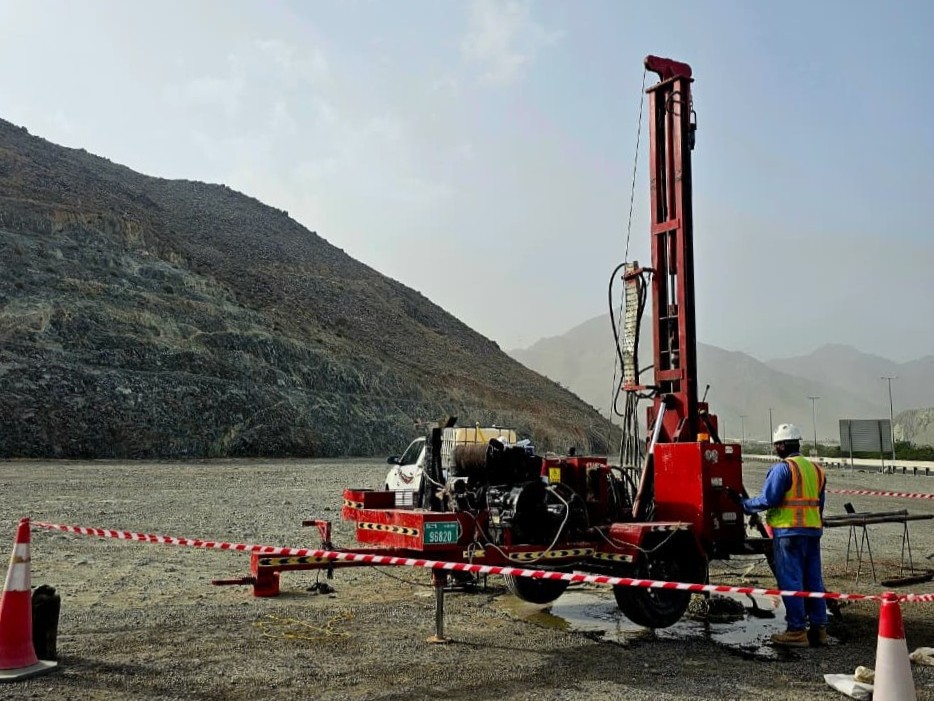
How Modern Rock Testing Helps UAE Industry Geotechnical Risk
Every structure has a story, but doesn’t start with concrete or steel.
It all starts with the dirt.
Before the first base is poured, engineers and geologists are already working hard to answer the question, “Can this ground hold what we’re about to build?”
That question is important in the UAE, where we are constructing higher, deeper, and quicker than ever; it is also crucial. The land here is really different. There are soft desert sands, weak limestone layers, and, occasionally, rock that looks sturdy on the outside but isn’t when you dig deeper.
That’s when rock testing comes in. We do it every day at Falcon Laboratory: we look into the materials underneath the surface to help engineers make safer, smarter, and stronger buildings.
The Ground in the UAE Is More Complicated Than It Seems
If you’ve ever worked on a construction site here, you know that the ground in the UAE may be unpredictable. One location might have dry, hard sand, whereas another site just a few kilometers away might be on mushy or broken rock.
They can be difficult if you don’t understand these distinctions early on.
- Sands that may become bent
Most of the region is encased in fine desert sand. It looks strong when dry, but can quickly lose durability if it gets wet from rain, leaks, or watering. It might cause the building to settle unevenly or even crack if it happens under a foundation.
- Rock Layers That Aren’t Strong
Not all of the rocks in the UAE are firm and sturdy. In locations like Abu Dhabi and Dubai, we commonly uncover limestone or gypsum-rich rock layers that aren’t very strong. These can break down or disintegrate over time, especially when wet.
- Settlement that isn’t even
When one portion of the ground compresses more than another, it can make buildings lean or break. Testing correctly can help you predict and stop this, saving you much money on repairs later.
- Issues with Groundwater
Groundwater can get very high in regions near the ocean or on land that has been reclaimed. Water can easily travel through porous rocks and impact basements or underground structures. Knowing how permeable the rock is might help you plan drainage and waterproofing systems.
Why it's important to test rocks

It’s not enough to take samples and run calculations when rock testing. It’s about knowing how the soil will act when work starts.
Once they have that information, engineers may choose the best design options, such as the correct sort of foundation, the suitable materials, and the proper protective systems.
We do a lot of rock and material testing at Falcon Laboratory that makes this tale very obvious.
Here are some of the most important ones:
- Unconfined compression strength (UCS) tells you how much force a rock can withstand before it cracks.
- Rock Quality Identification (RQD): This tells you how broken up the rock is. The greater the RQD, the more powerful and stable the rock mass.
- Tests for Density and Water Absorption: Show how dense the rock is and how much water it can hold.
- Permeability tests: Find out how readily water can get through, which is important for basements, tunnels, and foundations.
- Slake Durability Tests: See how well the rock holds up repeatedly as it gets wet and dry.
Every figure in such reports stands for stability, safety, and performance over time.
What Happens If You Don't Test
We’ve seen this occur more times than we’d like:
The project moves swiftly, testing is put off or neglected, and the foundation starts to shake or break months later. What should have been fixed with early testing costs much money to redo or revise the design.
Early testing helps you avoid the following:
- Foundations that break or sink over time
- Basements or tunnels that leak
- Delays because of changes made after digging
- Costs of materials that weren’t planned for during construction
- Testing just a few weeks at the start can save you months or even years of issues later.
Real Life Experiences from Projects in the UAE
We’ve worked on hundreds of sites in the Emirates, and each one has taught us new things about the land we’re constructing on.
- A tower in Dubai: Initially, everything seemed fine with the drilling. But when we analyzed the limestone samples, we found that the layer was weaker. The design team changed the depth of the foundation, and the building went up without any problems with settling.
- A project for subsurface utilities along the coast: Permeability tests showed that water could easily flow through the rock below the surface. That knowledge allowed engineers to use the correct waterproofing system, keeping the building safe from long-term leaks.
- A storage facility in Abu Dhabi: The earth had soft and hard rocks. We helped the team determine the best way to reinforce the slab by compressive strength and absorption tests. It stopped cracks and unequal load distribution.
These are just a few small instances, but they all prove that testing early is worth it.
Why Testing Early is Important
Money and time are always important in building. But while it comes to the ground, testing can be cheaper than guessing.
Project teams get a clearer picture when they include a rock testing lab in the early design phase. They know what kind of base to utilize, what to strengthen, and what to be careful of.
We consistently advise our clients at Falcon Laboratory, “The sooner you test, the stronger you build.”
How to Pick the Right Lab
A good lab doesn’t just give you numbers. It gives you knowledge.
Here are the most important things to think about when choosing a rock testing partner:
- You can trust these accreditations and qualifications.
- Engineers with a lot of experience who know how the ground works in the UAE
- Testing tools that are accurate and reliable
- Quick reporting for jobs that need to be done quickly
- Honest guidance and understanding of the results
That’s what Falcon Laboratory is known for. We are delighted to be one of the best testing laboratories in the UAE since we have a lot of expertise, the right technology, and a real enthusiasm for quality.
Building with Trust
Every test we undertake at Falcon Laboratory is far more than just a sample. It portrays what the years to come will be like, with a place for individuals to live, work, and talk to each other.
That’s why we care about testing. Not only do we run tests, but we also give engineers knowledge that helps them build things safely and with confidence.
We don’t only give customers statistics when they call us with test results. We also tell them what they signify, what to look for, and how to improve the design. Essentially, the difference between “evaluating” and genuinely helping to construct something from scratch.
Last Thoughts
The UAE’s construction sector moves swiftly, but the greatest builders know that strength originates underneath the surface.
Knowing what is below the surface, like unstable rock layers and sands that can fall apart, is the key to every successful operation. We learn the truth by doing complex tests on rocks.
We at Falcon Laboratory are happy to assist in making the UAE’s future secure and sustainable. Knowing your ground allows you to build anything and make it last.